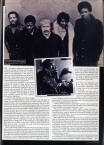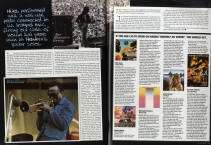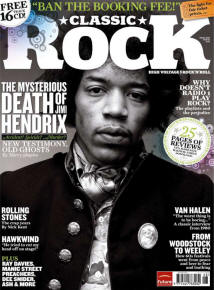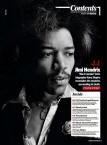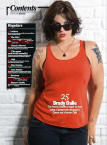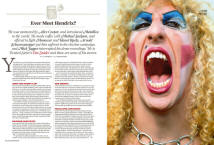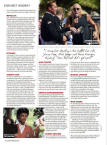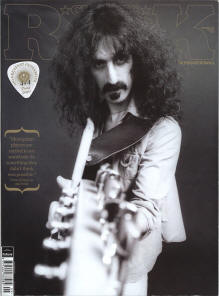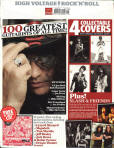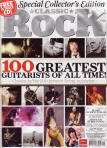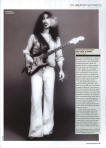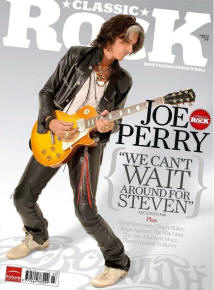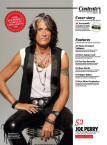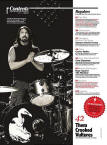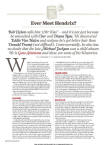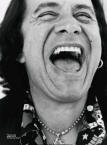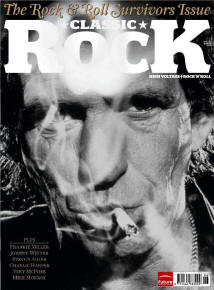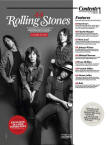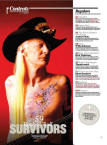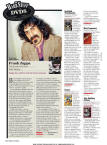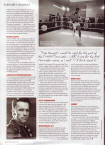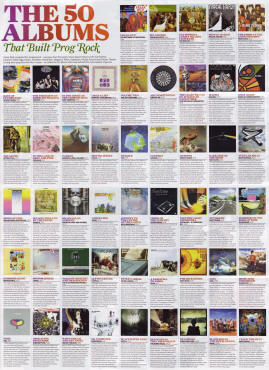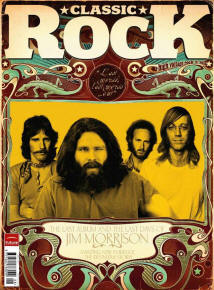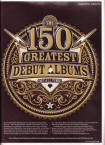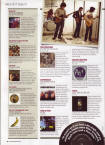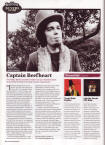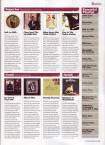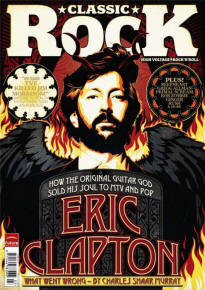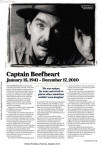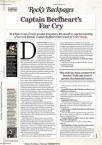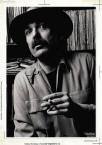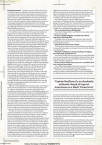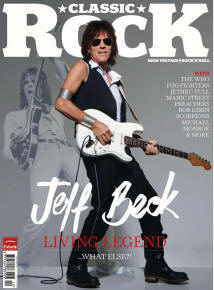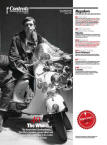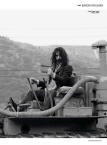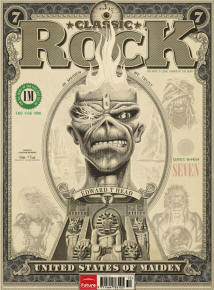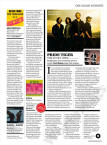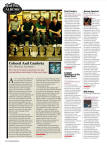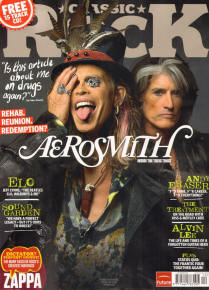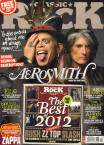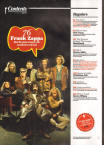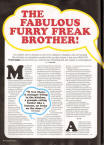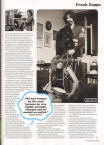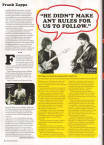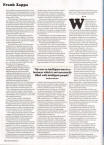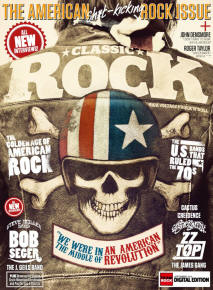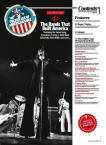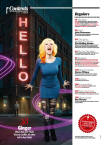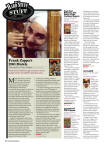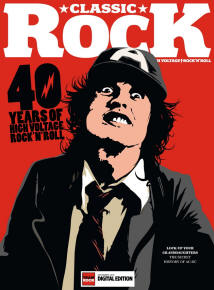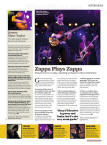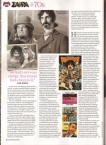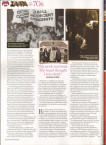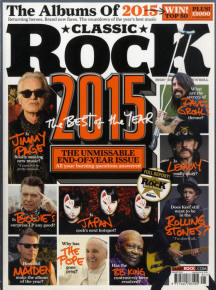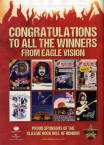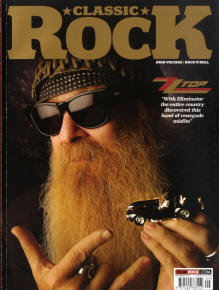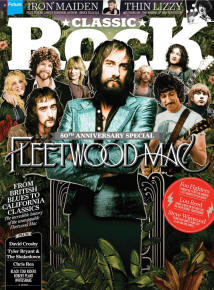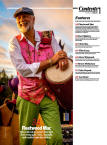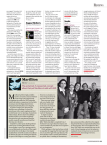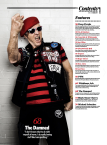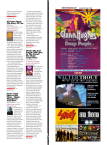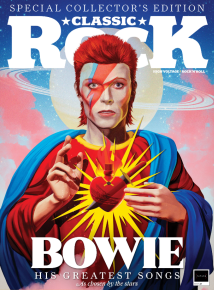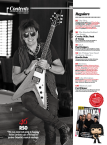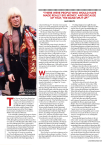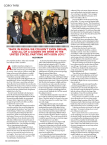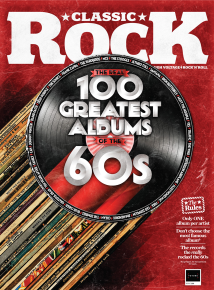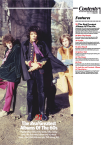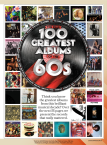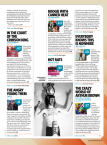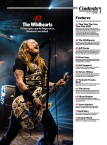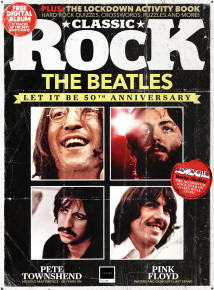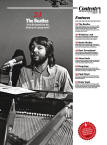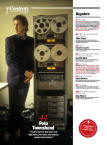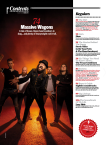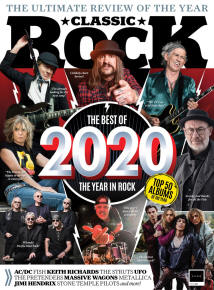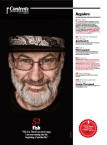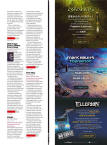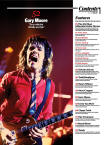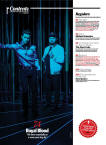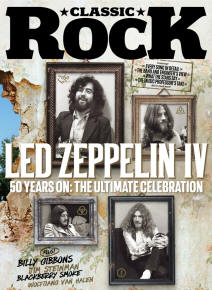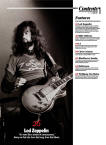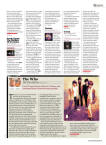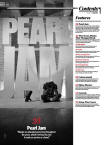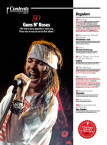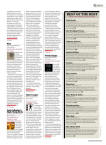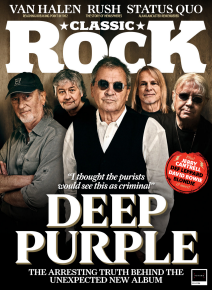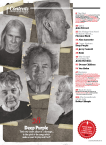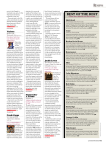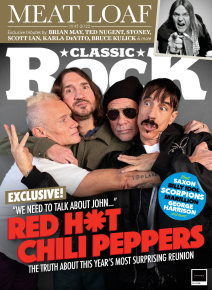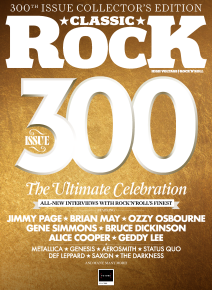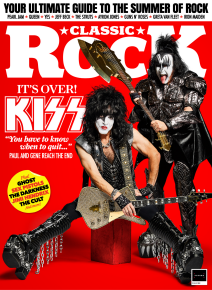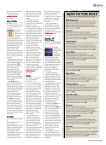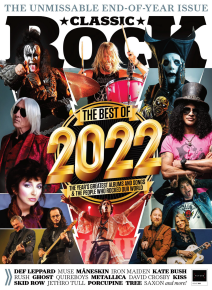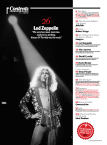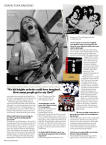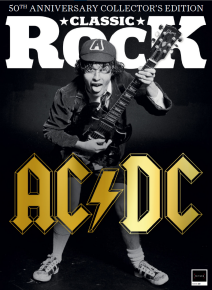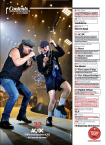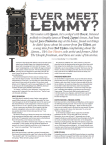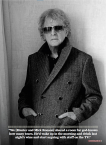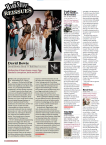Classic Rock
page 47:
Frank Zappa and his band the Mothers Of
Invention shoved jazz – along with everything else, from Stravinsky,
surf music, doo-wop and cocktail music – into their sound. 'Return
Of The Magnetic Monster', on the Mothers' 1966 debut 'Freak
Out', took the avant garde jazz of Coltrane, Sun Ra and Ornette
Coleman into the pop arena – and scared the hell out of a lot
of hippies. Later Zappa albums, particularly 'Uncle Meat', 'Burnt
Weenie Sandwich', 'Apostrophe' and 'Hot Rats', were straight-ahead
jazz rock albums. Zappa also worked with jazz fusion figures
such as violinist Jean Luc Ponty, who later joined the second
line-up of The Mahavishnu Orchestra, and keyboards wizard George
Duke, better known for his funk/disco output in the late 70s
and early 80s but a seminal figure in jazz rock, partucularly
on his 1977 album 'The Dream'.
Source: Fulvio Fiore
This issue focuses on "acid rock" and contains long article by Hugh Fielder on 60s Los Angeles acid scene. Frank Zappa and Captain Beefheart are both mentioned briefly plus a picture of the Mothers of Inventions is added.
The contents list and full texts are available at Classic Rock archive. We don't have page scans, but look at the same article with same pictures in Russian Classic Rock, December 2003.
We can’t leave LA without mentioning Frank
Zappa and his childhood and student chum Captain Beefheart,
two of the city’s most famous freaks. Zappa was caustically
anti-drugs, and albums like ‘Freak Out’, ‘Absolutely Free’ and
‘Lumpy Gravy’ with The Mothers Of Invention took the piss out
of the hippies while defying them to see through his own avant-garde
music.
The fact that most hippies didn’t get the joke enabled him to
keep on playing it. Some of them still don’t.
Captain Beefheart was more ambivalent about drugs.
He was an artist, apparently, so he was allowed to take them.
He described LSD as an “awfully overrated aspirin and very similar
to the old people’s Disneyland”. He took a singular delight
in breaking rock’n’roll conventions, and was outraged and disgusted
when record company executives altered his strange rhythms and
stranger harmonies to try to make them palatable.
His first album, ‘Safe As Milk’, sounded like a tripped-out
Howlin’ Wolf as the Captain’s voice gear-shifted instantly from
a soprano squawk to a sub-woofer growl while his band (including
a 16-year-old Ry Cooder) beat out a bluesy grunge. But behind
the gruff, almost menacing exterior there were plenty of deft
touches that suggested this was no ordinary punk. Thanks to
John Peel, the album was more popular in Britain than America.
For the Captain, however, it was just the beginning.
FRANK ZAPPA/JOHN DENVER
Back in 1985 I was fiercely opposed to the idea of placing warning
labels on records. I appeared before the US Senate – along with
Frank Zappa and John Denver. Frank and me were both concerned
about how Denver would handle it. He had a successful TV show
and a movie career; he was the clean-cut and mom's-apple-pie
John Denver. They invited him assuming he would be on the side
of truth, justice and the American way. But Denver hadn't forgotten
how Rocky Mountain High had been banned for being a drugs song,
which it wasn't. And Oh, God, the movie he did with George Burns
[in 1977] was thought by many to be sacrilegious. So when Denver
compared the idea of suckering records to Nazi book-burnings,
the Senate was kind of surprised.
Zappa's children – Moon Unit and Dweezil – turned out to be
Twisted Sister fans. I was there with my father, Bob, who's
a police officer and an ex-Korean War veteran – a tough guy.
Frank asked my dad to look after his kids while he testified.
To this day it's one of Bob's fondest memories: "Hey, Dee, remember
the time we were in Washington and Frank Zipper asked me to
watch Dweezil Unit and Moon Zipper?" Bless him.
Special collector's issue "100 Greatest Guitarists Of All Time" chosen by the 100 greatest living guitarists. Issue had 4 collectible covers: Eddie Van Halen, Jimi Hendrix, Keith Richards and Frank Zappa.
One page on Frank Zappa with commentary by Dweezil Zappa. No Zappa content on the CD.
Russian edition of "100 Greatest Guitarists Of All Time".
Source: slime.oofytv.set
Gene Simmons on page 36
FRANK ZAPPA
I knew his son, Dweezil, socially and he actually learned to
play guitar from a guitar player I discovered ... Eddie Van
Halen. So it all comes full circle somehow. Dweezil actually
brought me over to see Frank before he passed away and we started
to talk about stuff - music and life philosophies and so on,
and after he passed away it was his family that actually gathered
around the idea of doing something post his passing. I asked
if they had any unfinished Frank pieces because I'd love to
finish them and get the family around, and so we came together
on Black Tongue, which was Frank's title, not mine. I had this
30-second bit that I built an entire song on, this loop, and
I played all the instruments and got all the Zappa family in.
It was the only song in the entire Zappa history where the entire
remaining family members actually sang around the same mic.
The issue included free poster mag The 50 Albums That Built Prog Rock. Freak Out is listed as first entry.
Excerpt from interview with W.A.S.P frontman Blackie Lawless, page 40:
FRANK ZAPPA
When the PMRC stuff was going on he really ran point
on that whole thing for everybody. He had been through censorship
stuff in the 60s and he had seen this monster rear its ugly
head before. He knew it was about guys seeking a higher office,
it wasn’t about censorship. We didn’t, we were kids, we were
new. The thing I got off of him a few years later was I realised
that he was running point for us. Specifically he was catching
all the hell, he was paving that path for us to do the music
we were doing without really giving it a lot of thought. Without
thinking about pressure or being molested, so to speak.
I ran into him about a year before he died. I sat down and told
him: "I want to thank you for what you did. I understand
now why you did what you did." He was very humble about
it; he just shrugged his shoulders and was like, "Hey,
I was just doing my job."
2010 October
No. 150
150 Greatest Debut Albums Of All
Time - Freak Out
p 48
Buyer's Guide - Captain Beefheart
pp 104-105
2011 March
No. 155
Captain Beefheart, January 15,
1941 - December 17, 2010
By Mick Farren, p 21
Captain Beefhearts Far Cry
By Lester Bangs, pp 80-82, 85-86, 120
This article is extracted from Every Picture Tells A Story: The Rolling Stone Years by Baron Wolman.
2012 October
No. 176
GTO's Permanent Damage
(review)
By Mick Farren, p 67
Captain Beefheart & His Magic Band - The Lost Broadcasts
(review)
By Mick Farren, p 94
The Mothers Of Invention - We're Only In It For
The Money (review)
By Ian Fortnam, p 102
2016 Sepember
No. 228
Frank Zappa: The Lumpy Money Project/Object/
Road Tapes Venue #1 - #3
By Ian Fortnam, p 92
2017 November
No. 242
Dweezil Zappa. Get ready for 50 years
of Frank and the Mothers
By Dave Ling, p 109
Page 65:
...
Bon Jovi weren’t the band’s only champions in the US. Belov
[Gorki
Park guitarist Alexey Belov] had met Frank Zappa via Stas
Namin when Zappa visited Russia in the late 80s. Because Belov
spoke English, he was assigned as Zappa’s driver. Zappa returned
the favour by appointing himself Gorky Park’s unofficial mentor
for the next few years.
“They were making their name for themselves over there, and
they were one of the things that were brought to his attention,”
says Frank’s son Dweezil Zappa. “I think it was a combination
of musical and cultural things that drew him toward them. What
was unusual at the time was this fusing of Western rock’n’roll
with Russian cultural influences, from classical music to folk.
They had a different kind of a sound because of their background.
It wasn’t like they were trying to be a Russian Bon Jovi – they
had their own thing, with an American production edge.”
Frank Zappa passed on nuggets of wisdom he’d learned from 25
years in the music industry: what to do, what not to do, when
to talk, when to shut up. He invited the band to his house in
Los Angeles. “Every time he did a new recording, he would invite
us to his house,” says Belov. “We were at his place a hundred
times.”
...
2019 March
No. 259
100 Greatest Albums of the 60s
pp 21-79
#49 We're Only In It For The Money
by Ian Fortnam, p 38
#39 Hot Rats
by Paul Henderson, p 41
2020 July
No. 276
Frank Zappa: Brighton Centre, April
16, 1988 (concert review)
By Tim Batcup, p 104
2022 July
No. 302
Cynthia Plaster Caster
By Dave Ling, p 11
Frank Zappa: Zappa/Erie
By Ian Fortnam, p 86
On page 106, Ian Anderson, My biggest disappointment:
When Frank Zappa was terminally ill, I reeived a message to
say he would like me to call him. I’d never met him. Iwas a
fan, but my instinct was he really didn’t like Jethro Tull,
so it was a little odd. I dialled the number three times, but
each time I hung up in panic; I was embarrassed—what do you
say to a dying man? A few weeks later he died. From what I heard
he’d wanted to talk to a few people, just to say hi, and I was
one of them. It wouldn’t have changed anything, except I would
have had my first and last words with one of the great original
composers and performers of rock music history.
Page 106, Steve Harley, The Guitar Hero:
Frank Zappa. He was a one-off - unique as a composer, as a wit,
and then as a guitar player. He played jazz, basically, and
he hardly ever bent a note, it was all just brilliant technique.
Play Stink-Foot from Apostrophe ('); he rips
off this solo out of nowhere that is just beyond historic.
2024 Summer
No. 329
Frank Zappa & The Mothers Of
Invention: Live At The Whisky A Go Go 1968
By David Stubbs, p 82
Page 50, Ian Hunter:
KEITH MOON & FRANK ZAPPA
Keith had seen Mott at the [Hollywood] Palladium, and he rang
me the following morning and said: “Do you want to go out tonight?”
He met me in this little Volkswagen – Keith and this lady in
the front, me and a rabbit hutch in the back, for some reason.
We were going to someone else’s house, but they weren’t in,
so he said: “We’ll go to Frank Zappa’s.”
So we wound up at Zappa’s house. Zappa was an absolute gentleman.
He said: “I’ve got this stuff on two-inch tape downstairs, do
you want to hear it?” Apparently once you got trapped by Frank
you could be there for hours listening to stuff with no vocals,
no melody. But I didn’t know this. So I’m sitting there listening
to people jamming. After forty-five minutes, Zappa said: “What
do you think?” I said: [politely] “Great.” So he put another
one on. Keith knew what was going on – he’d made himself scarce
in another part of the house. Keith and Zappa both had reputations
as being mad, but they were both gentlemen.


